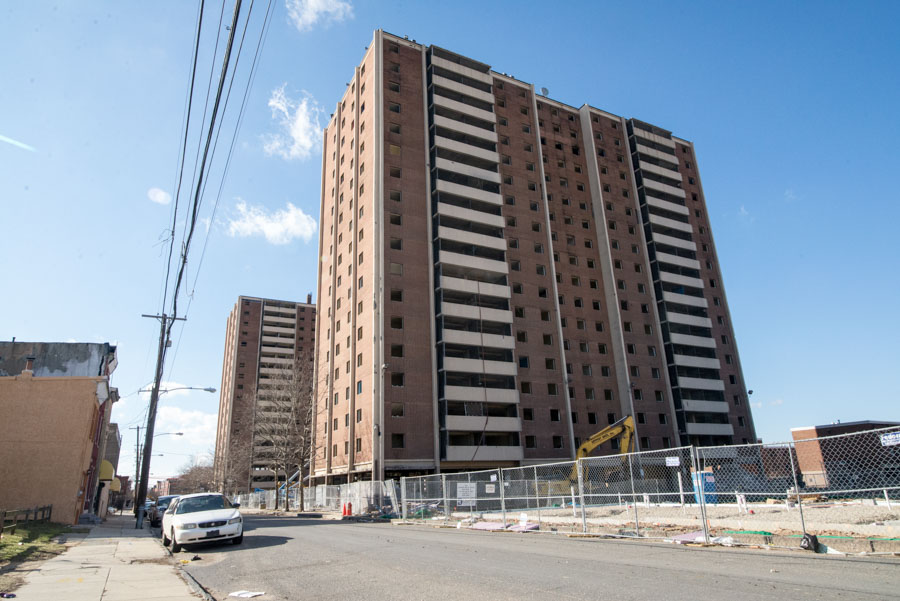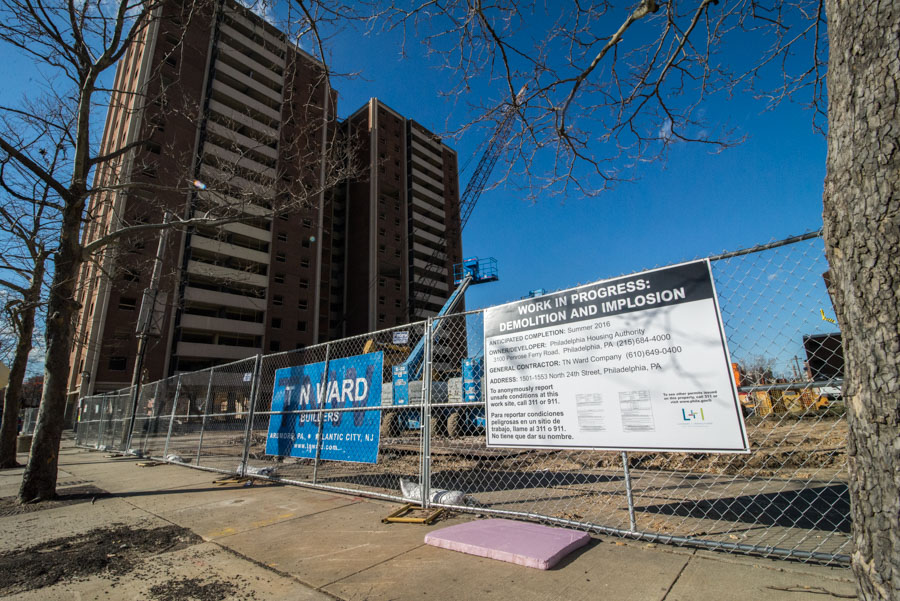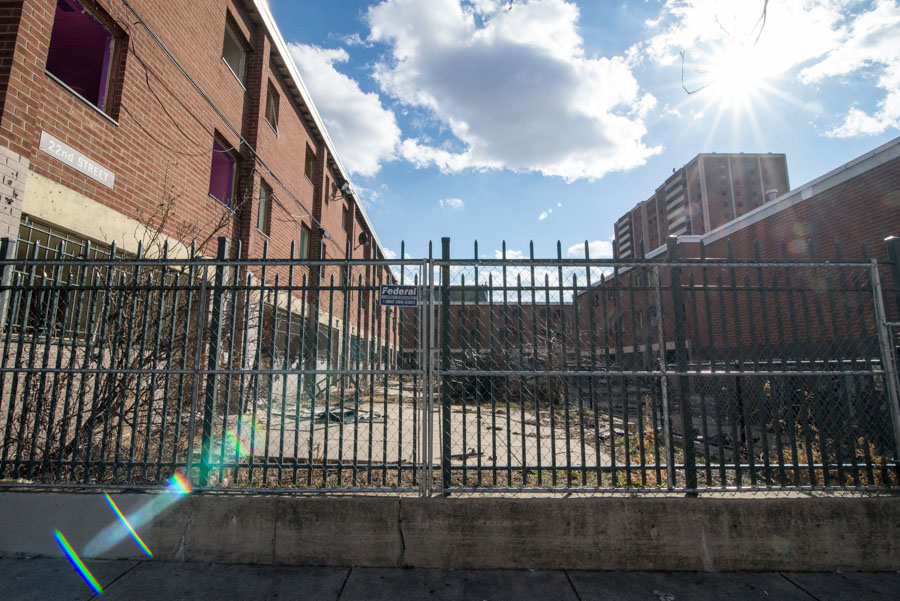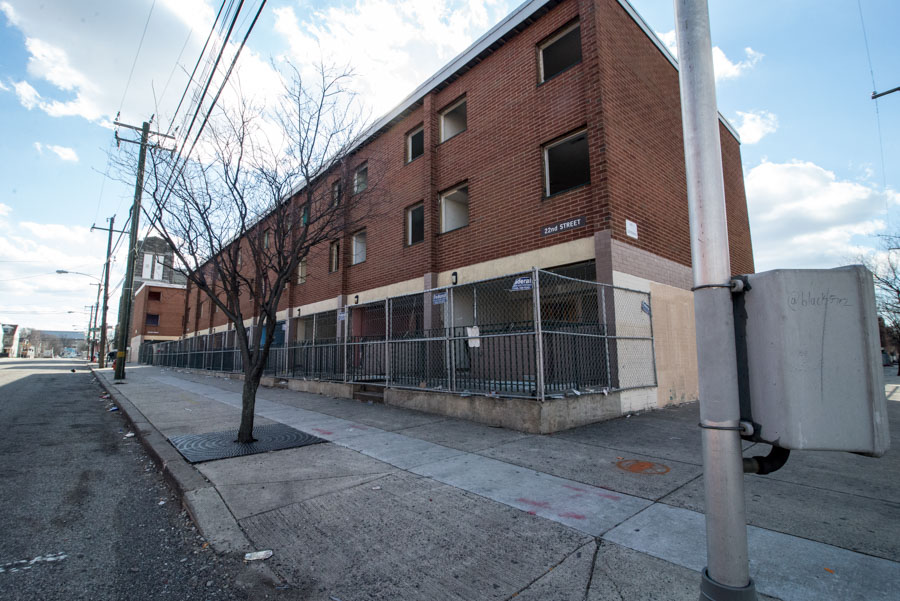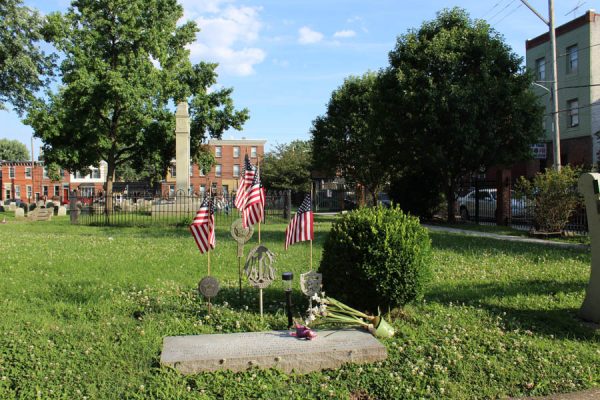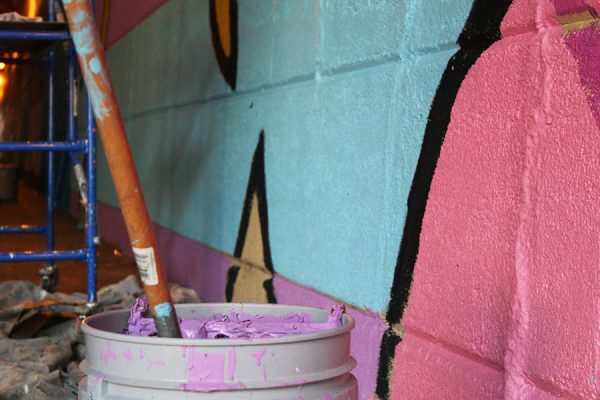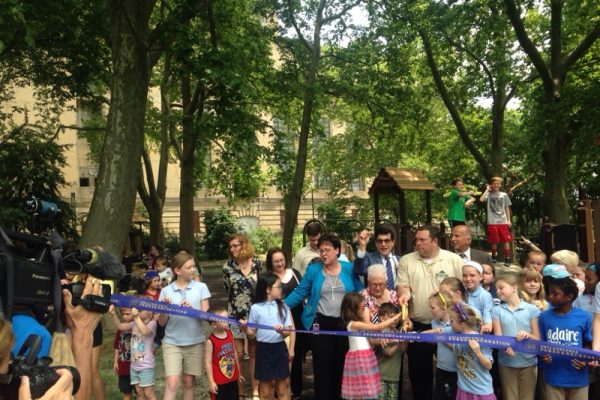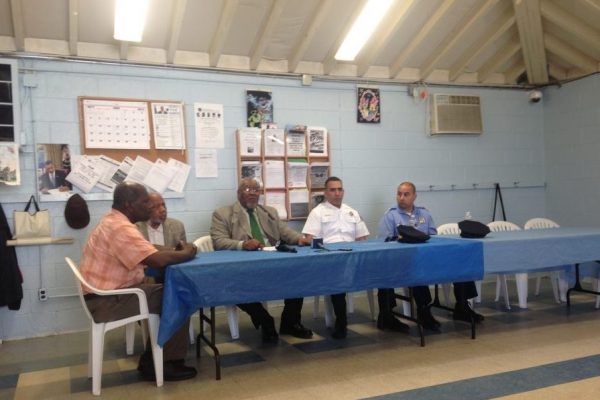Impending Implosion: Norman Blumberg Buildings in Sharswood Set to Come Down This Saturday
The impending implosion of two of the three Norman Blumberg Apartment buildings is big news — On Saturday, March 19th at 7:15 AM, two high-rise buildings will come down in Sharswood. The Philadelphia Housing Authority (PHA) asks all residents in the “Evacuation Zone” to be cleared out by 5 AM.
The PHA is moving forward with this demolition as part of a controversial Urban Renewal Project. The Blumberg Apartments are located between Cecil B. Moore Avenue (north), South College Avenue and Poplar Street (south), 20th Street (east), and 27th Street (west). According to Scott Beyer’s article on Forbes.com, “the area is defined by a large, crime-ridden public housing complex called the Norman Blumberg Apartments, a rundown retail strip along Ridge Avenue, and hundreds of abandoned homes.”
But the city already owned 500 of the 1300 units that are in their project zone. Many of the properties were obtained through “abandonment and tax delinquency.” Through the controversial process of eminent domain, the city is vacating the residents of the four-by-six-block area and replacing the high-rise buildings with mixed-income properties.
As Beyer describes, this ten-phase project will be a $500 million investment that will not be returned due to the low taxes the residents will be paying. Mixed-income housing usually has about 30 percent of their units affordable for low-income residents. The new development will have about 66 percent of its units affordable for low-income residents.
But before looking at the future of these proposed developments and the controversy that has sprung from them (we’ll be taking a deeper look at this in an upcoming issue of The Spirit), let’s look back on what happened in this neighborhood in the past and discover how this community became the newest site for such a project. As an easy reference point, we will focus on Cecil B. Moore Avenue, which is a half of a mile away from the Blumberg Apartments, and in between them and Temple University.
It was not until 1987 that Cecil B. Moore Avenue came into existence. Columbia Avenue from 33rd Street to Frankford Avenue was renamed for one of the most significant Civil Rights leaders in the history of Philadelphia. A Temple University graduate, Cecil Bassett Moore earned this honor because of his contributions to the Civil Rights movement in the 1960s. Moore was elected President of the NAACP, organized peaceful protests at segregated facilities, and was responsible for the desegregation of Girard College in 1968 after years of “mass protest.”
But before Moore was making Civil Rights achievements in the city, the demographics of the area were vastly different than what we observe today. The Temple University Library tells us that beginning in the 1830s, Columbia Avenue was occupied mostly by German Jews and a small population of Jews from Eastern Europe. For a century, this area thrived. Business owners kept their businesses in town, but they moved their families to suburbs in West Philadelphia. In the decade before the Great Depression, most residents of Columbia Avenue were Eastern European Jews.
In the years following World War II (1940s/50s), the economy was thriving, business was great, and residents of the area began another wave of moving to the suburbs. With the German Jews and Eastern European Jews moving out, middle-to-high-income African-Americans moved in, and the neighborhood was still doing great. The Great Migration of the 1950s/60s describes the mass movement of African-Americans from the South who came to the North in order to find better job opportunities. For the first time in its existence, Columbia Avenue was a predominantly African-American corridor.
The middle-to-high-income African-American families that replaced the Europeans moved out of the neighborhood next. The citizens left behind were the disenfranchised Southern African-Americans who had little money and few job opportunities. Businesses were sold in the area to the people who now lived there. However, since the people residing in the area had very little money, these businesses failed.
City governments across the nation observed cities becoming poorer in the 1950s. In order to attract businesses and real-estate agencies to these areas, Urban Renewal Projects took over the city landscape. For any number of reasons, businessmen did not choose to invest in this area. The Urban Renewal Project in North Philadelphia built tenements and public housing for the time being.
Poor residents were forced to live on top of one another and tensions ran high. Citizens began to feel targeted by the police officers of the area and racial conflicts began to arise as about half of the black population in 1960s Philadelphia was crammed into North Philly. The average income of the area dropped to 30 percent lower than the city average at this time. Due to decades of poverty, more businesses closed.
In 1969, the PHA completed construction on the Norman Blumberg Apartments, a low-income, high-rise public housing development, and with it came poverty that was hard to overcome. The remaining middle class residents soon left the neighborhood, and those who stayed behind watched as the community fell victim to crime and abandonment.
But many in the neighborhood believe the PHA is to blame for the blight in the first place. According to Forbes, the widespread opinion around Sharswood is that the area began decaying in 1969 when the Blumberg apartments were built, and has worsened as the city took ownership of more and more lots, leaving them unplowed and trash-filled. This has caused residents to call the PHA “the worst slumlord in the city.”
In his Forbes article, Beyer writes that he is skeptical of the plan, saying,
“Philadelphia will spend $500 million in taxpayer money, confiscate hundreds of private properties, and overhaul a business community; will further concentrate poverty in an already-poor area that was primed for revitalization; and will empower a mismanaged agency by granting it more land, housing, and even a new headquarters.”
Adam Lang is a local activist who lives with his wife in Sharswood. They own a home and several adjacent lots in the neighborhood, which the PHA seized. After receiving an eminent domain notification, Lang wrote in his blog that,
“I will not deny the neighborhood is blighted. It is. It is filled with many vacant lots, sealed buildings and regular homes that need repair, but it is very important to discuss where the blight is coming from. Of the 1300 properties, about 500 are coming from the City of Philadelphia [and several hundred more from the PHA]… What is the logic in giving the people who are the main factors in the blight, even more power and authority over the neighborhood?”
PHA president Kelvin Jeremiah told Newsworks last summer that “We have not always been a good landlord. We have not always been a good partner. That’s the old PHA. That’s not the new PHA.” This remains to be seen as further development beings following Saturday’s implosion.
Spirit News will continue to report on the PHA’s plans to develop Sharswood in upcoming stories. If you have any thoughts to share, or wish to speak with us about how the PHA’s plans are affecting you and your community, please reach out to us at news@spiritnew.org. We are eager to tell your story.
Information for this article was taken from: data.inquirer.com, Jennifer Lin’s Philly.com article “Troubled Blumberg Housing Project Targeted for Change”, m.philaplace.org, metro.us, northerncity.library.temple.edu, pcacares.org, pha.phila.gov/housing, philly.curbed.com, Scott Beyer’s Forbes.com article “Philadelphia to Seize 1,330 Properties for Public Redevelopment”, seniorhousingnet.com, spotcrime.com, static1.squarespace.com, and temple.edu/safety/reports.
